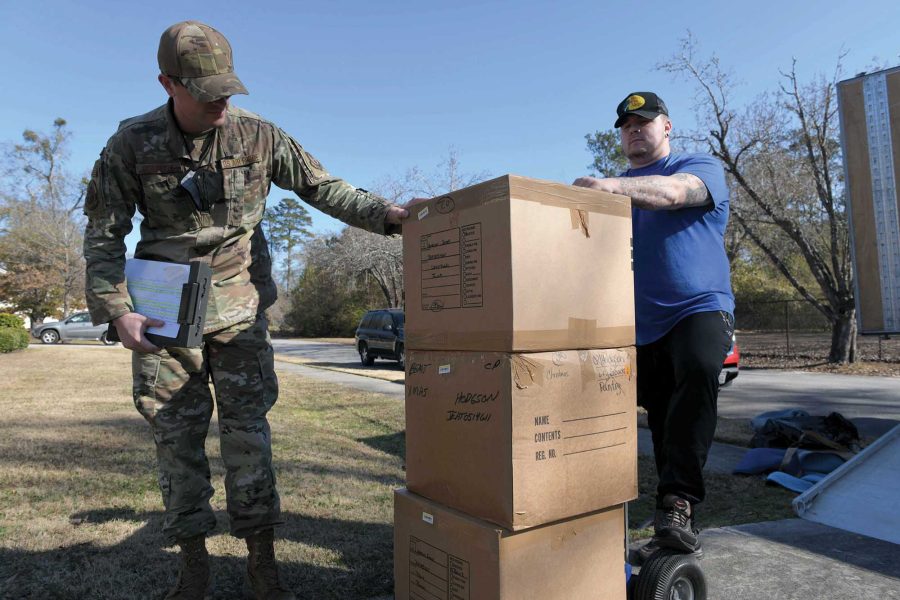The Air Force put some permanent change of station moves within the continental United States on hold due to a shortfall in its personnel budget.
Airmen without authenticated orders in hand who were scheduled to move to a new duty station between Oct. 1 and Dec. 31 are now on hold until Jan. 31 or later, according to a memo written by the Air Force Personnel Center and shared on the popular Facebook page Air Force amn/nco/snco on Aug. 14. An Air Force spokesperson confirmed the memo was authentic.
The spokesperson could not immediately provide an estimate for how many Airmen might be affected by the changes. The group on hold includes Airmen with a controlled tour, such as an instructor position, that is scheduled to begin or expire in November or December. The assignments beginning or ending in November are pushed to Jan. 31, while those beginning or ending in December are extended to Feb. 28.
The PCS pause does not affect Airmen moving to or from locations outside the continental United States, Space Force Guardians, or members of the Air National Guard or Air Force Reserve, the memo said. Airmen with their authenticated orders in hand are also safe, no matter what their projected departure date, as are Airmen with a projected departure date of Sept. 30 or earlier.
Another group of Airmen unaffected by the delay are those with an assignment that meets special criteria, such as professional military education and other forms of training.
“Impacted Airmen are permitted to request an exception to policy and should work closely with their leadership to submit a request,” the spokesperson said. “Those impacted should contact their local Military Personnel Flight with questions.”
The spokesperson did not explain what caused the funding shortfall, but the funding should be replenished with the start of fiscal year 2026 on Oct. 1. PCS funding is provided when orders are authenticated, so by delaying orders, the Air Force keeps the military personnel budget in the black and avoids violating federal law.
While the next fiscal year starts in October, the move dates for Airmen caught up in the delay won’t be until Jan. 31 or later, so they have time to plan their moves.
“The gap between order authentication and the report date provides Airmen sufficient time to arrange the movement of their household goods to their new duty location,” the spokesperson said.
Still, the changes are not ideal for Airmen trying to buy or sell a house, or line up dates for their children to start at a new school, as some commenters pointed out on the unofficial Air Force subreddit.
The hold comes about three months after the Air Force put a similar pause on retirement and separation orders, also due to a depleted personnel budget. The service delayed issuance of separation orders for troops with a separation date of Jan. 1, 2026 or later. It also delayed issuance of retirement orders for troops with a retirement date of April 1, 2026 or later.
“It’s not because the Chief of Staff of the Air Force said ‘we want to wait to give people orders,’” RAND senior operations researcher and Air Force veteran Lisa Harrington said in May. “It’s because the Air Force must comply and not overspend that budget by law.”
In 2023, the Air Force had to pause bonus programs, PCS moves, and some other incentive pays for nearly three weeks when the service ran out of personnel funds. Higher-than-expected PCS costs—a result of inflation—and higher retention and recruiting bonuses all contributed to the shortfall, officials said at the time.
While external factors may make it impossible to eliminate personnel budget shortfalls entirely, experts at RAND say budget stakeholders can reduce the risk by better integrating their decision-making and producing better data on the impact of bonuses and other compensation tools.
The pause is happening as the Pentagon conducts a wider re-think of the entire PCS process. In May, acting undersecretary of defense for personnel and readiness Jay Hurst gave the military services four months to develop plans to reduce their budgets for “discretionary” PCS moves by 50 percent by fiscal year 2030 compared to the fiscal 2026 budget.
The Pentagon spends about $5 billion total moving service members and their families every year, and many of them don’t like it. A survey of Active-Duty spouses released in May found record rates of spouses (32 percent) want to leave the military, with a large number of them frustrated by the difficulty of finding employment, child care, and reimbursement for moving costs after a move.
